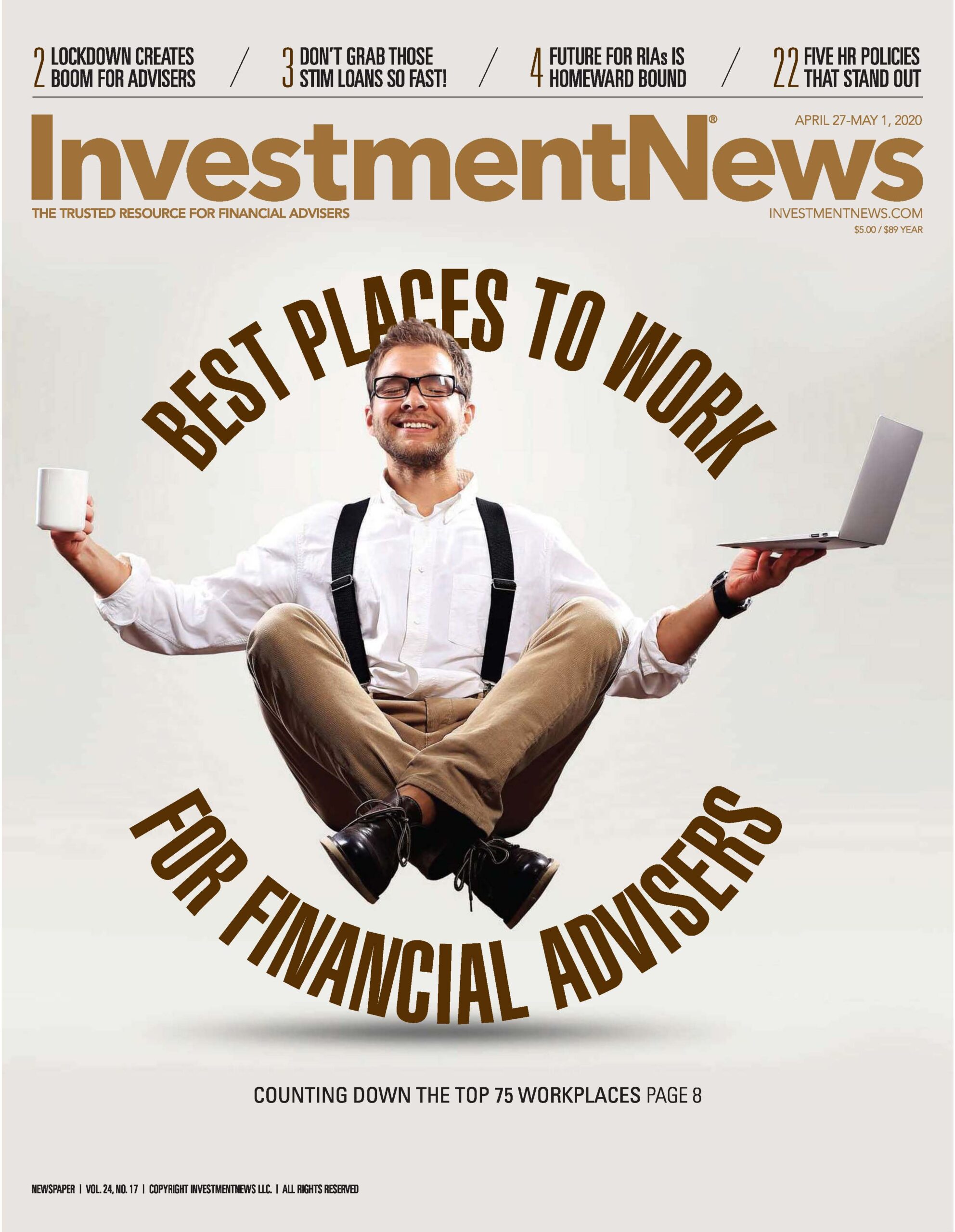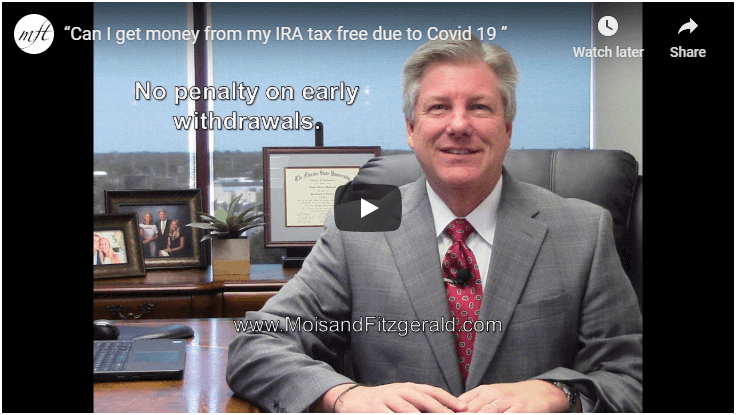Can I get money from my IRA tax free due to Covid-19?
In response to the Covid-19 pandemic, the CARES Act changed several IRA and retirement plan rules for people of all ages. The Act allows qualified individuals to take distributions during 2020 of up to $100,000 penalty-free, but not tax-free, from their IRAs or company plans like a 401(k). The law allows company plans to permit coronavirus related distributions (CRDs) and loans up to $100,000, but no plan is required to allow either and most plans will need to be amended to add these features.
To make a CRD tax free, the distribution must be returned to the IRA or retirement plan within three years of the date of distribution.
The default tax treatment of CRDs is to spread the taxable income evenly over 2020, 2021 and 2022 tax returns. Alternatively, the taxpayer may opt to report all the income on their 2020 return. To make a CRD tax free, the distribution must be returned to the IRA or retirement plan within three years of the date of distribution. If this is done in 2021 or 2022, an amended return may be required to get back the taxes paid before funds were returned to the respective accounts.
Individuals wishing to treat a distribution as a CRD must:
- Be diagnosed with the SARS-CoV-2 or COVID-19 virus by a test approved by the CDC or;
- Have a spouse or dependent who is diagnosed or;
- Experience “adverse financial consequences” from being quarantined, such as being furloughed, laid off, having hours reduced, being unable to work due to lack of childcare, or owning or operating a business that closed or reduced hours.
Covid distributions can be made as frequently as needed but cannot exceed a total of $100,000, regardless of from which eligible accounts the distributions are taken. CRD treatment can apply to any distribution taken in 2020, including distributions taken before the CARES Act date of enactment or outside of quarantining periods. The funds can be used for any purpose. If you would like more details, contact us or see the IRS FAQ page regarding Covid related relief for retirement plans.
It is not too late to make IRA contributions
The federal deadline to make 2019 contributions to traditional IRAs, Roth IRAs, and Health Savings Accounts has been extended. If you have earned income and are eligible to make a contribution, you have until July 15, 2020 rather than April 15, 2020.
CARES Act changes RMD rules
Taxpayers who turned 70 ½ before December 31, 2019 are subject to Required Minimum Distributions (RMDs) from IRAs and other retirement accounts. For 2020, no RMDs are required for IRAs, Inherited IRAs, and the most common company sponsored retirement plans such as 401(k)s and 403(b)s, regardless of whether a taxpayer has been affected by Covid-19 or not.
For 2020, no RMDs are required for IRAs, Inherited IRAs, and the most common company sponsored retirement plans such as 401(k)s and 403(b)s, regardless of whether a taxpayer has been affected by Covid-19 or not.
According to the new IRS Notice 2020-23, if you have already taken a distribution for RMD purposes from a traditional IRA, as long as the distribution was made on or after February 1, 2020 and you did not utilize a 60 day rollover in the prior 12 months, you can return the funds by July 15, 2020 and avoid the taxes on the distribution. If the distribution came from a 401(k) plan, the same July 15 deadline of returning the funds applies, but the 12-month rule regarding rollovers does not. We hope to see guidance allowing the return of January 2020 distributions from all types of affected accounts later in the year.
Skipping RMDs in 2020 will lower your 2020 tax bill. However, while you do not have to take money from your accounts, you may wish to do so anyway. Talk to your advisor about this issue.
Note: The waiver of RMDs for 2020 does not affect the ability to make Qualified Charitable Distributions (QCDs) from IRA accounts. QCDs remain the most tax efficient way to make charitable donations for persons over age 70 ½ and we believe many non-profits will appreciate the donations more than usual this year..
Making News…

We continue to help the Orlando Sentinel with reader questions by participating in a free call-in hotline and its Ask An Expert feature.

Dan Moisand,CFP® continues to write for MarketWatch, Florida Today, and Financial Advisor:
What’s the best bond investment when interest rates are so low?
Should I do an additional IRA conversion at the end of the year?
Is my income too high to make an IRA contribution?
I have leftover money in my child’s 529 college savings account — what can I do with it?
Am I too old to take money from my IRA and put it into a Roth?
How are taxes handled in an inherited trust?
Vacation Homes: Heaven Or Retirement Hell?
In the News…

“During moments like this, people become speculators,” Fitzgerald said. “They start flipping coins.…They’re trying to see what the next shiny object is, which doesn’t play out well when there’s emotion involved,” he added. “It won’t generally be a good result. To be an investor, you have to be a contrarian,” he said. “When people are running for the door, it’s usually a good signal it’s a great time to buy.”
Improving Americans’ generally weak level of financial literacy is an important cause and Charlie has been particularly involved in the effort, helping to get a new elective course on personal finance into Florida’s high school offerings. His prominent role led Investment News to seek Charlie’s input for a special feature on financial literacy.
“As financial planners, we get it,” Charlie said of financial literacy. “We see the benefits of smart money decisions. We see the consequences of bad money decisions. You’ve got to start this education before young people go into the adult world.”
Dan had a few thoughts to share with Think Advisor about preparing people for retirement. First is the technical aspect of how to generate cash flow in retirement while sifting through all the options. “Advisors face lots of assumptions, variables and moving parts,” Dan said. Secondly, there’s a psychological element where retirees who have saved their whole lives are now faced with spending their savings, a difficult transition for many. “It’s a hard switch, because they are adjusting to not working and seeing the value of their ‘nest egg’ change more in a month than they spent on their first house,” said Dan.
Things We Found of Note
Political divisions get a lot of the attention in election years. This piece gives us some insights into how Americans are divided on more lighthearted topics as well.
60 percent of American adults do not have a will. (AARP) This almost surely means even more do not have other critical documents like healthcare surrogates that would be helpful to their families. It also suggests that most of the $68.4 trillion of wealth expected to be transferred by boomers to heirs over the next 25 years will incur more taxes, court fees, and other costs than is necessary.

